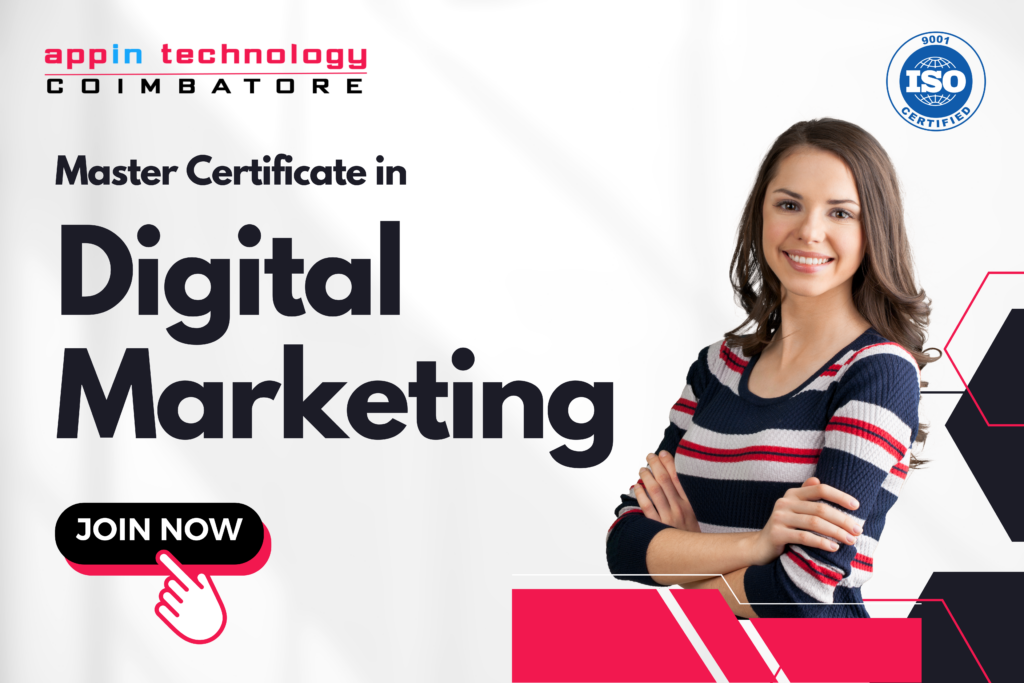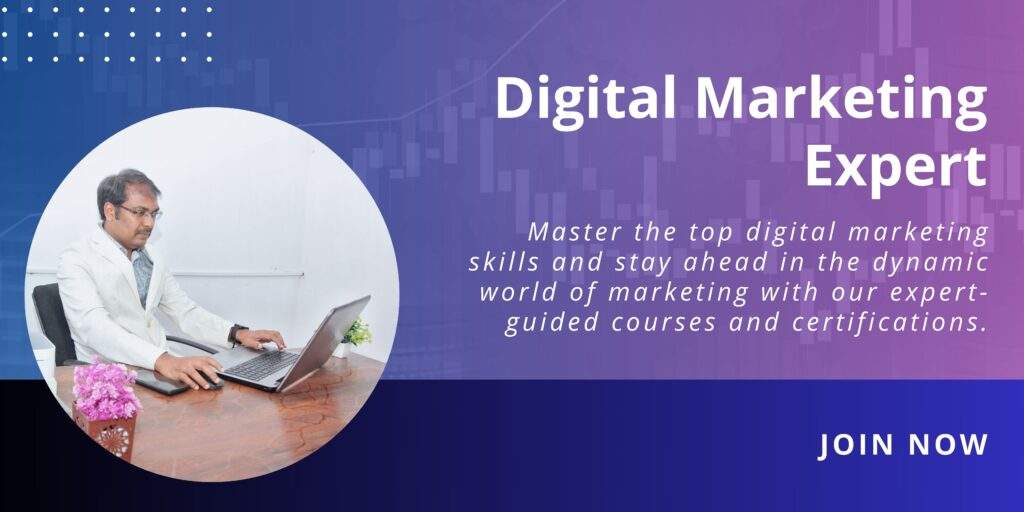Table of Contents
1. Introduction to Digital Marketing Careers
2. Why Choose a Career in Digital Marketing?
3. Key Career Roles in Digital Marketing
3.1 Digital Marketing Manager
3.2 SEO Specialist
3.3 Content Marketing Strategist
3.4 Social Media Manager
3.5 PPC Specialist
3.6 Email Marketing Specialist
3.7 Web Analytics Expert
3.8 Affiliate Marketing Manager
4. Skills Required for Digital Marketing Roles
5. How to Start Your Digital Marketing Career
6. Benefits of Pursuing a Digital Marketing Course
7. Future Trends in Digital Marketing Careers
8. Conclusion: Choosing the Right Digital Marketing Role for You
1. Introduction to Digital Marketing Careers
In today’s digitally driven world, a career in digital marketing offers unmatched opportunities for growth and innovation. As businesses shift their focus to online platforms, the demand for skilled digital marketing professionals has skyrocketed. This field encompasses a wide array of roles, from creating engaging content to leveraging data analytics, allowing professionals to explore diverse career paths that align with their strengths and interests.
Digital marketing careers stand out because of their adaptability and relevance across industries. Whether it’s a multinational corporation, a local startup, or a non-profit organization, every entity benefits from a strong digital presence. Roles such as SEO specialist, social media manager, and content strategist allow individuals to build expertise in specific niches, while positions like digital marketing manager provide opportunities to lead comprehensive campaigns.
Pursuing a career in this field requires not just technical skills but also creativity, analytical thinking, and a customer-centric approach. By staying updated on trends and mastering tools like Google Analytics, SEMrush, and social media platforms, professionals can drive real impact.
For those seeking a dynamic and rewarding career, digital marketing offers endless possibilities. It’s not just about promoting brands; it’s about building meaningful connections with audiences in a digital-first era.
2. Why Choose a Career in Digital Marketing?
Digital marketing has emerged as one of the most sought-after career paths in today’s digital-first world. With businesses increasingly focusing on their online presence, the demand for skilled digital marketers continues to grow exponentially. Choosing a career in digital marketing offers a dynamic, flexible, and rewarding professional journey with immense potential for growth.
One of the primary advantages of digital marketing is its versatility. This field encompasses various career roles, including SEO specialist, content strategist, social media manager, and PPC expert, catering to different skill sets and interests. Moreover, digital marketing professionals are essential across industries, making it a recession-proof career choice.
Digital marketing is also highly measurable and results-driven. Professionals can track their campaigns’ performance in real-time, optimize strategies, and witness the direct impact of their efforts on business growth. With an ever-evolving landscape, this career path ensures continuous learning through advancements in technology, tools, and consumer behavior.
Pursuing a digital marketing course equips you with in-demand skills like Google Ads, email marketing, and web analytics, making you job-ready. Whether you aim to work for top companies or start your own business, digital marketing provides unparalleled opportunities for success in the modern economy.

3. Key Career Roles in Digital Marketing
The field of digital marketing offers a variety of exciting career opportunities, each requiring unique skills and expertise. Let’s explore some of the most sought-after roles:
3.1 Digital Marketing Manager
A digital marketing manager oversees comprehensive marketing campaigns across multiple channels. They strategize, implement, and analyze campaigns to achieve business goals, ensuring alignment with brand objectives. Strong leadership, analytical, and project management skills are essential for this role.
3.2 SEO Specialist
SEO specialists optimize websites to rank higher in search engine results, increasing organic traffic. They excel in keyword research, on-page optimization, and link-building strategies, staying updated with search engine algorithm changes to maintain high visibility.
3.3 Content Marketing Strategist
Content marketing strategists focus on creating and promoting high-quality, engaging content. They plan, write, and distribute blogs, videos, and infographics that attract and retain target audiences, driving brand authority and conversions.
3.4 Social Media Manager
Social media managers develop and execute strategies across platforms like Facebook, Instagram, and LinkedIn. They create engaging posts, monitor trends, and foster community interaction to boost brand awareness and customer engagement.
3.5 PPC Specialist
PPC specialists manage pay-per-click advertising campaigns to maximize ROI. They design targeted ads, monitor performance, and refine strategies to generate leads and increase website traffic effectively.
3.6 Email Marketing Specialist
Email marketing specialists craft compelling email campaigns to nurture leads and retain customers. They design newsletters, automate sequences, and analyze metrics like open rates and click-through rates for continuous improvement.
3.7 Web Analytics Expert
Web analytics experts interpret data from tools like Google Analytics to assess website performance and user behavior. They provide actionable insights to optimize campaigns and improve user experience.
3.8 Affiliate Marketing Manager
Affiliate marketing managers build partnerships with affiliates to promote products or services. They oversee affiliate programs, monitor performance, and ensure compliance, driving sales through external networks.
4. Skills Required for Digital Marketing Roles
To excel in digital marketing, a diverse skill set is essential, blending creativity, technical expertise, and strategic thinking. At the core of all digital marketing roles is a strong understanding of consumer behavior and market trends. Professionals must possess excellent communication skills to craft compelling messages that resonate with their target audience across various platforms.
A solid foundation in SEO (Search Engine Optimization) and SEM (Search Engine Marketing) is crucial for driving organic and paid traffic to websites. Analytical skills are equally important, as tools like Google Analytics and data visualization software are used to track campaign performance and refine strategies. Social media management requires a deep understanding of platform algorithms, audience engagement, and content creation tailored to each channel.
Technical proficiency in tools such as email marketing software, CRM platforms, and ad management systems like Google Ads is indispensable. Additionally, creativity is vital for designing visually appealing ads, writing persuasive copy, and developing innovative strategies to capture attention in a crowded digital space.

5. How to Start Your Digital Marketing Career
Starting a career in digital marketing can be an exciting and rewarding journey, especially in today’s digital-first economy. To succeed, a strategic approach and continuous learning are essential.
Begin by gaining a solid understanding of digital marketing fundamentals. Learn about key areas such as SEO, social media marketing, content marketing, email marketing, and pay-per-click (PPC) advertising. Online courses and certifications, such as Google Ads or HubSpot certifications, are excellent starting points to build foundational knowledge and demonstrate expertise to potential employers.
Hands-on experience is equally important. Create a personal blog, build a portfolio of projects, or manage social media accounts to showcase your skills. These practical experiences highlight your ability to execute digital marketing strategies effectively.
Master digital marketing tools like Google Analytics, SEMrush, Mailchimp, and Canva. Understanding these platforms is crucial for managing campaigns, tracking performance, and optimizing strategies.
Networking can significantly boost your career prospects. Join online communities, attend digital marketing seminars, and connect with industry professionals on LinkedIn to stay informed about the latest trends and job opportunities.
Internships or entry-level positions offer valuable on-the-job training. Working under seasoned professionals allows you to refine your skills and gain industry insights.
Finally, stay updated on emerging trends and technologies, as digital marketing is a constantly evolving field. A growth mindset, coupled with a commitment to learning, will set you apart as a forward-thinking professional in this competitive industry.
6. Benefits of Pursuing a Digital Marketing Course
Pursuing a digital marketing course is a smart investment for individuals aiming to thrive in the fast-paced, technology-driven business landscape. This field is one of the most in-demand professions, and acquiring formal training provides a strong foundation to build a successful career.
A comprehensive digital marketing course equips you with the essential skills and knowledge to navigate various aspects of the industry. From mastering SEO, social media strategies, and content marketing to understanding data analytics and PPC campaigns, you gain hands-on expertise to create impactful marketing strategies. Additionally, many courses include practical assignments and real-world projects, ensuring that you are job-ready from day one.
One of the key benefits is career flexibility. With digital marketing skills, you can pursue roles in diverse industries, work with agencies, become a freelancer, or even start your own business. The ever-growing demand for skilled professionals ensures excellent job prospects and competitive salaries.
Certified courses often provide access to industry tools like Google Ads, HubSpot, and SEMrush, allowing you to familiarize yourself with platforms widely used by professionals. Moreover, certifications enhance your resume, making you a preferred candidate for employers.
Another advantage is staying updated with the latest trends and technologies in a rapidly evolving field. Courses designed by industry experts ensure you are learning cutting-edge techniques and strategies.

7. Future Trends in Digital Marketing Careers
Digital marketing is constantly evolving, and staying ahead of emerging trends is essential for building a successful career in this dynamic field. The future of digital marketing careers is shaped by advancements in technology, shifting consumer behaviors, and the increasing importance of personalized and data-driven strategies.
One of the most significant trends is the rise of artificial intelligence (AI) and machine learning in digital marketing. AI-powered tools are transforming how marketers analyze data, predict consumer behavior, and automate tasks like content creation and email marketing. Professionals proficient in AI-based tools will be in high demand.
The growing adoption of voice search optimization is another key trend. As devices like smart speakers become more prevalent, marketers need to optimize content for voice queries, focusing on conversational keywords and local SEO.
Video marketing continues to dominate, with platforms like TikTok, Instagram Reels, and YouTube becoming central to engaging younger audiences. Interactive and live video formats are emerging as powerful tools for storytelling and audience connection.
Another trend shaping careers is the emphasis on sustainability and social responsibility. Brands increasingly align their marketing strategies with ethical practices, creating demand for professionals skilled in crafting purpose-driven campaigns.
Finally, data privacy and compliance are gaining importance as consumers become more aware of how their data is used. Digital marketers need to stay informed about regulations like GDPR and develop transparent, ethical marketing strategies.
The future of digital marketing careers is bright, offering professionals opportunities to innovate and thrive in an ever-changing industry.
8. Conclusion: Choosing the Right Digital Marketing Role for You
Embarking on a career in digital marketing offers a world of opportunities, but selecting the right role is crucial for long-term success and satisfaction. With a diverse array of career paths such as SEO specialist, content marketing strategist, social media manager, and PPC expert, the field caters to various skills and interests.
The key to choosing the right role lies in understanding your strengths, passions, and career aspirations. If you enjoy analyzing data and optimizing strategies, roles like SEO specialist or web analytics expert may be ideal. For those with a creative flair, content marketing or social media management can offer fulfilling opportunities. Similarly, individuals with a knack for sales and partnerships might excel as affiliate marketing managers.
Investing time in gaining relevant skills and certifications through a digital marketing course can help you explore these roles more effectively. Practical experience, internships, and networking are also instrumental in understanding the nuances of each role and finding your best fit.
Digital marketing is a dynamic field, and your chosen role can evolve as you gain experience and discover new interests. By aligning your talents with industry demands and staying adaptable, you can build a thriving career in this ever-evolving landscape.
